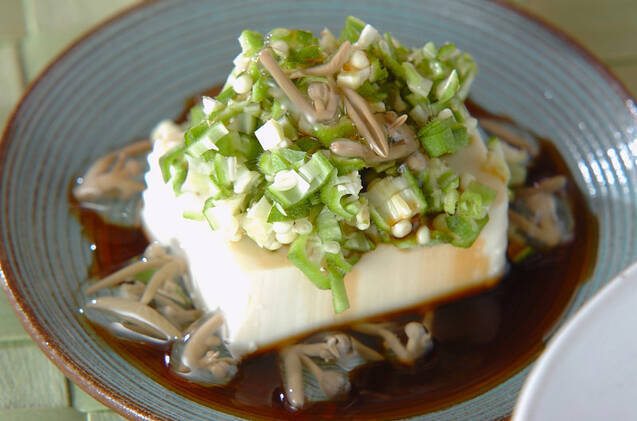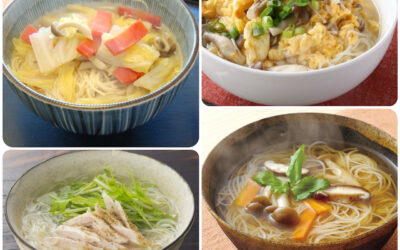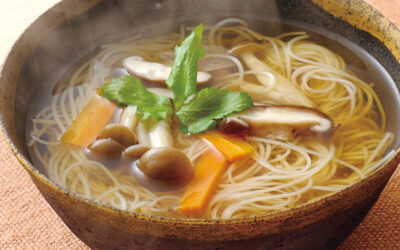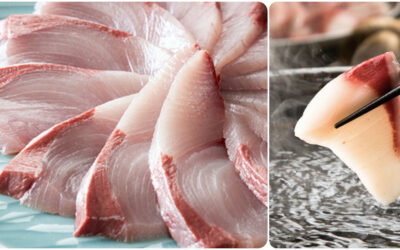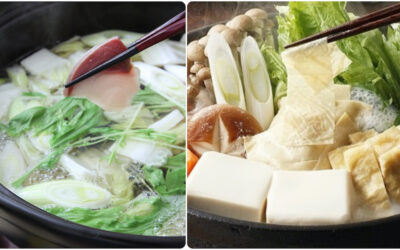
Kitchen Culture Cooking Club
EXPLORE and PRACTICE Japanese cooking in your own kitchenAbout Kitchen Culture Cooking Club
Welcome to the Kitchen Culture Cooking Club, a community space providing encouragement to those who want to EXPLORE and PRACTICE Japan’s washoku wisdom in their own kitchens.
To facilitate this, themed projects will be posted to this page periodically. Project Assignments and links to relevant reference material stored on this site will be posted to this page. Anyone, anywhere in the world, with a sincere interest in Japanese food culture is welcome to browse the contents of this page and then replicate the themed project in their own kitchen.
For those who wish to display-and-discuss their projects with like-minded people, I invite you to join the KITCHEN CULTURE Cooking Club Facebook Group (formerly the TSUDOI Project), an interactive community space.
PROJECT Enjoy Junsai

PROJECT Enjoying Junsai
潤菜料理 (junsai ryōri)
JUNSAI (water shield; Brasenia schreberi) grows naturally in lakes, ponds and slow streams in many parts of the world but only Japan and China have a long history of cultivating the plant as a food. Young, unfurled sprouts covered in slippery, transparent jelly, are especially prized by the Japanese.
Junsai can be enjoyed in soups, salads or as a topping for chilled noodles, sushi rice (easiest to eat as a gunkan wrapped in nori), tofu or egg custard.
Using the recipes below as a point of departure, create your own JUNSAI dish…
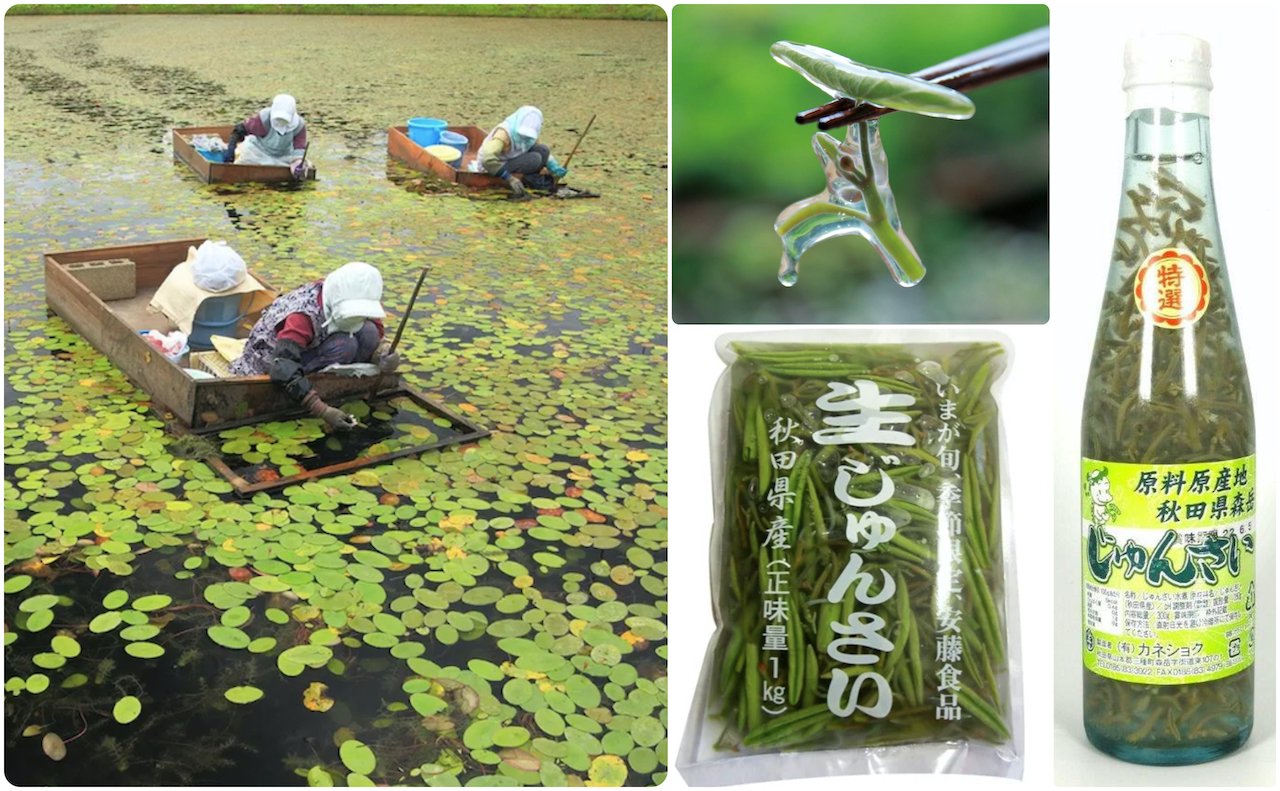
Prepping JUNSAI
Chilled Tofu with Toppings
冷奴 hiya yakko, chilled blocks of tofu topped with junsai and okra enhanced by seasoned soy concentrate — either the VEGAN version or UMAMI Essence.

Junsai as a Topping for Tamago-Dofu Custard
玉子豆腐、じゅんさい添え
Make tamago-dofu custard according to instructions on page 285 of WASHOKU.
Spoon prepped junsai over each portion and drizzle with either Umami Essence OR Vegan Seasoned Soy Concentrate.
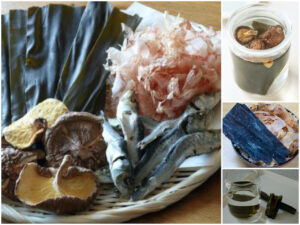
Standard Sea Stock (this recipe includes a variation known as oigatsuo or “extra smoky sea stock”) is made with kelp and fish flakes.
A simple vegan broth, Kelp Alone Stock is, as its name suggests, made from just kombu.
A more complex broth called Sankai Dashi is made from dried shiitake mushrooms and kelp.
Visit my Kitchen Culture blog to learn about JUNSAI, a summertime delicacy.
Read my June, 2024 newsletter about the texture of food, mouthfeel.
Recipes and Resources
Stock (Dashi)
Dashi stock is essential to making soups and simmered or stewed dishes. Dashi is also used when making many egg dishes and all sorts of sauces, dips and dressings. Using good dashi will make a noticeable difference in the outcome of so many dishes you prepare.
Click to download recipes for (vegan) Kelp Alone Stock or Standard Sea Stock + Smoky Sea Stock
How to Cook Rice
In Japanese, the word for cooked rice, ご飯 GOHAN, is the same as the word for a meal, ご飯 GOHAN. Indeed rice is central to the meal. Download the Rice with Mixed Grains recipe.
How to Prepare Sushi Rice
Sushi dishes are made with rice that has been seasoned (with sweetened vinegar) AFTER being cooked. Download the Classic Sushi Rice recipe.
Quick Pickles
The Japanese enjoy a wide variety of tsukémono pickles, many can be assembled quickly and are ready to eat within a short time.
Download a recipe for Quick-Fix Hakusai Cabbage.
PROJECT Nyumen
Above, Four Examples of Nyūmen: Hakusai, Carrot and Shiméji (top left); Egg Drop, Shiméji and Scallions (top right); Chicken and Mitsuba with Sanshō (bottom left); Shiitaké, Shiméji, Carrot and Mitsuba.煮麺 ・Nyūmen This Kitchen PROJECT is about making NYŪMEN (sōmen...
NYUMEN
煮麺 ・NyūmenSōmen Noodles Served in Piping Hot Broth Sōmen is usually served chilled, often on chunks of ice. Dipped into a deeply flavored sauce to which condiments have been added, it becomes a survival strategy for hot, humid days. But in Kagawa Prefecture (Shikoku),...
Buri Shabu Nabé
鰤しゃぶ鍋Buri Shabu Nabé BURI (yellowtail) is fabulous in the winter! If you can source top-quality tenderloins of fish, you could opt for luscious slices of sashimi. Though my favorite way to enjoy fresh buri is swished-through-bubbling-broth buri shabu nabé – barely...
PROJECT Shabu Shabu Nabé
Swished-through-bubbling-broth Buri Shabu Nabé (left) and Shōjin Shabu Nabé (right)しゃぶしゃぶ鍋Shabu Shabu Nabé This Kitchen PROJECT is about making Shabu Shabu Nabé hot-pots in YOUR kitchen. The Japanese have a fondness for naming dishes with onomatopoeia. The name shabu...

